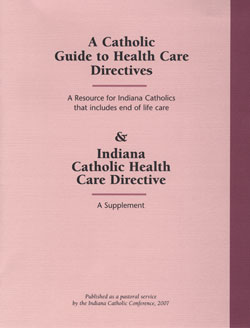Catholic Conference publishes health care directives guide

The 10-page document published by the Indiana Catholic Conference defines and simplifies legal terms and common health care language used in end-of-life care, and outlines Catholic ethics tied to end-of-life decisions.
Criterion staff report
Whether undergoing a routine medical procedure or facing a life-threatening circumstance, Catholics are being asked by hospitals to complete health care directives in case they are alive but unable to speak for themselves.
“Often, faithful Catholics are presented documents, and they are unsure if these comply with Catholic teaching,” said Glenn Tebbe, who as executive director of the Indiana Catholic Conference serves as public policy spokesperson for the Indiana bishops. “Many of these individuals are seeking help, and need support from the Church in order to integrate their faith with their decision.
“To address the need and to assure the faithful that the Church is supportive of them as they face these questions,” Tebbe said, “the Indiana bishops have published A Catholic Guide to Health Care Directives and the Indiana Catholic Health Care Directive.”
The 10-page document defines and simplifies legal terms and common health care language used in end-of-life care, and outlines Catholic ethics tied to end-of-life decisions.
In a question-and-answer format, the guide answers common questions such as who should have a health care directive, if an attorney is needed, what happens if a person doesn’t have a health care directive, who to choose as a health care representative, and when a health care directive is needed.
Beyond the basic, practical and legal questions which are answered, the heart of the guide provides a six-point Catholic ethical road map to follow when families are facing
end-of-life decisions.
Respect for human life at every stage and the inherent dignity of the human person is a fundamental principle of Catholic teaching, Tebbe noted. The six-point ethical framework outlines basic rights due every human being because of this inherent dignity, and translates these rights into appropriate health care actions for those facing end-of-life situations.
The six-point end-of-life ethics outlined in the guide are:
- Human life is a precious gift from God; it never becomes something to be disposed of.
- We have the right to direct our own care and the responsibility to act according to the principles of Catholic moral teaching.
- Suicide, euthanasia, and acts that intentionally would cause death by act or omission are never morally acceptable.
- Death is a beginning, not an end.
- There should be a presumption in favor of providing a person with nutrition (food) and hydration (water), even if medically assisted, as long as this is of sufficient benefit to outweigh the burdens involved.
- We have the right to comfort and to seek relief from pain.
The guide also answers ethical questions such as are Catholics morally obligated to have an advance directive, is organ donation morally acceptable, and how can I make sure that decisions made on my behalf are consistent with my Catholic beliefs.
Approved by the Indiana Catholic Conference’s legal counsel, the document also contains a tear-out form which can be used as a legal, Catholic faith-based advanced directive when a person is admitted to the hospital.
The health care guide will be distributed to hospitals and health care professionals statewide. Parish staff and resource centers also will receive copies to share with parishioners. Copies of the document can be viewed and downloaded for personal use or for parish forums on the ICC’s Web site at http://indianacc.org. Click the Resources button on the left to view the statement.
The U.S. Conference of Catholic Bishops, the national counterpart for the Indiana Catholic Conference, has published a comprehensive document called Ethical and Religious Directive for Catholic Health Care Services. It is available at the USCCB Web page at www.usccb.org.
The ICC is the statewide coordinating body for the five Roman Catholic dioceses in Indiana.
Its basic purpose is to serve the spiritual, moral and material well-being of the people of the state; by serving as the official spokesperson for the bishops and Catholic faithful regarding state and national matters; by representing the Church and developing cooperative relationship where common public policy interests exist with religious and civic, social and governmental units; and by serving as liaison between the Catholic Church in Indiana and national Catholic groups in areas of common public policy interests.
The ICC board consists of the five Indiana bishops and a lay board member from each diocese appointed by the bishop.
The Indiana Catholic bishops include Indianapolis Archbishop Daniel M. Buechlein; Lafayette Bishop William L. Higi; Evansville Bishop Gerald A. Gettelfinger; Fort Wayne-South Bend Bishop. John M. D’Arcy; and Gary Bishop Dale J. Melczek.
Lay board members include Bill Bickel, Archdiocese of Indianapolis; Joseph A. Rice, Diocese of Lafayette-in-Indiana; Diane L. Bender, Diocese of Evansville; Richard B. Urda, Jr., Diocese of Fort Wayne-South Bend; and Gregory A. Sobkowski, Diocese of Gary.
According to the 2007 general summary of the Official Catholic Directory P.J. Kenedy & Sons, the Archdiocese of Indianapolis has 232,473 Catholics; the Diocese of Lafayette-in-Indiana has 103,280 Catholics; the Diocese of Evansville has 86,987 Catholics; the Diocese of Fort Wayne-South Bend has 158,275 Catholics; and the Diocese of Gary has 185,570 Catholics for a total of 766,585 Roman Catholics in the state of Indiana. †
